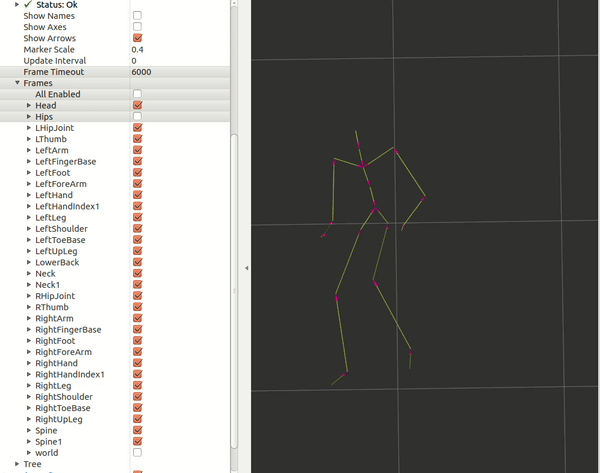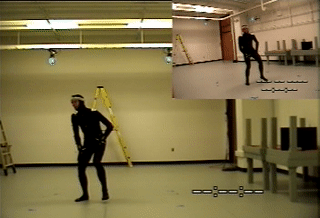Only released in EOL distros:
Package Summary
Documented
The bvh_broadcaster package
- Maintainer: Mingfei Sun <mingfei.sun.hk AT gmail DOT com>
- Author: Mingfei Sun <mingfei.sun.hk AT gmail DOT com>
- License: BSD
- Source: git https://github.com/mingfeisun/bvh_broadcaster.git (branch: master)
Overview
This package broadcasts BVH files (a motion capture data format) as tf transfromations.
GitHub repository: https://github.com/mingfeisun/bvh_broadcaster
Data input
Input contains two string parameters:
A path to BVH file, e.g., example.bvh
- A name of frame for motion capture to be loaded on, e.g., "world" frame, or "odom" frame.
You can find relevant BVH-formatted CMU MoCap from this post. Get BVH-formatted motion capture data from here.
Usage
1 python bvh_broadcaster.py [-h] [-n NAME] [-l] bvh_file base_frame
2
3 positional arguments:
4 bvh_file A path to bvh file that you want to broadcast
5 base_frame An existing frame in rviz on which the skeleton will
6 be loaded
7
8 optional arguments:
9 -h, --help show this help message and exit
10 -n NAME, --name NAME Node name, default: BVHBroadcaster
11 -l, --loop Loop broadcasting
For example:
1 # add execution access
2 chmod +x scripts/bvh_broadcaster.py
3 # loop broadcasting bvh to world frame
4 python scripts/bvh_broadcaster.py example/13_14.bvh world -l
Now, you can view the result in rviz:

The original actor and BVH file are as follows:


BVH resources for Motion Capture
CMU provides a lot of useful motion capture data, see CMU MoCap. Nevertheless, these data are not presented in BVH format. You can find relevant BVH-formatted CMU MoCap from this post.
